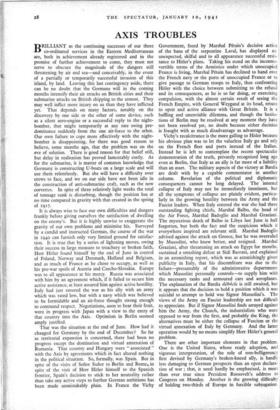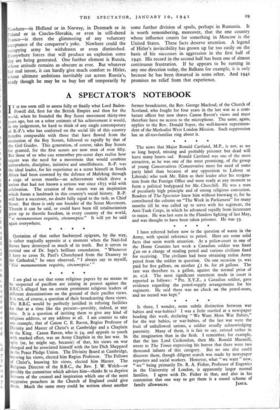AXIS TROUBLES
BRILLIANT as the continuing successes of our three co-ordinated services in the Eastern Mediterranean are, both in achievement already registered and in the promise of further achievement to come, they must not serve to obscure the magnitude of the dangers still threatening by air and sea—and conceivably, in the event of a partially or temporarily successful invasion of this island, by land. Leaving this last contingency aside, there can be no doubt that the Germans will in the coming months intensify their air attacks on British cities and their submarine attacks on British shipping to the utmost. They may well inflict more injury on us than they have inflicted yet. That depends on many factors, notably on the discovery by one side or the other of some device, such as a silent aero-engine or a successful reply to the night- bomber, that might temporarily at any rate swing pre- dominance suddenly from the one air-force to the other. Our own failure to cope more effectively with the night- bomber is disappointing, for there was good reason to believe, some months ago, that the problem was on the eve of solution. There is good reason for that belief still, but delay in realisation has proved lamentably costly. As for the submarine, it is matter of common knowledge that Germany is constructing U-boats on a large scale and will use them relentlessly. But she will have a difficulty over crews to face, and we on our side have not been idle in the construction of anti-submarine craft, such as the new corvettes. In spite of three relatively light weeks the total of tonnage sunk is disturbing, though the position has at no time compared in gravity with that created in the spring of 1917.
It is always wise to face our own difficulties and dangers frankly before giving ourselves the satisfaction of dwelling on the enemy's. But it is highly unwise to exaggerate the gravity of our own problems and minimise his. Surveyed by a candid and instructed German, the course of the war in 194o can furnish only very limited ground for satisfac- tion. It is true that by a series of lightning moves, owing their success in large measure to treachery or broken faith, Herr Hitler found himself by the end of June in control of Poland, Norway and Denmark, Holland and Belgium, and as much of France as he chose to occupy, as well as his pre-war spoils of Austria and Czecho-Slovakia. Europe was to all appearance at his mercy. Russia was associated with him by an agreement which, if it failed to secure him active assistance, at least assured him against active hostility. Italy had just entered the war as his ally with an army which was rated low, but with a navy which was believed to be formidable and an air-force thought strong enough to command respect. Negotiations, soon to bear their fruit, were in progress with Japan with a view to the entry of that country into the Axis. Optimism in Berlin seemed amply justified.
That was the situation at the end of June. How had it changed for Germany by the end of December? So far as territorial expansion is concerned, there had been no progress except the domination and virtual annexation of Rumania. That country and Hungary were " associated " with the Axis by agreements which in fact altered nothing in the political situation. So, formally, was Spain. But in spite of the visits of Sefior Suffer to Berlin and Rome, in spite of the visit of Herr Hitler himself to the Spanish frontier, Spain's decision to stick to her neutrality rather than take any active steps to further German ambitions has been made unmistakably plain. In France the Vichy Government, freed by Marshal Petain's decisive action of the bane of the serpentine Laval, has displayed an unexpected, skilful and to all appearance successful resis- tance to Hitler's plans. Taking his stand on the incontro- vertible terms of the Armistice under which unoccupied France is living, Marshal Petain has declined to hand over the French navy or the ports of unoccupied France or to give passage to German troops to Italy, thus confronting Hitler with the choice between submitting to the refusal and its consequences, as he is so far doing, or exercising compulsion, with the almost certain result of seeing the French Empire, with General Weygand at its head, return to open and active affiance with Great Britain. It is a baffling and unenviable dilemma, and though the hesita- tions of Berlin may be resolved at any moment they have not been resolved yet, no doubt because either decision is fraught with as much disadvantage as advantage.
Vichy's recalcitrance is the more galling to Hitler because his obvious plan was to let the valueless Italy go and rely on the French fleet and ports instead of the Italian. Instead he is left to contemplate the recent spectacular demonstration of the truth, privately recognised long ago even at Berlin, that Italy as an ally is far more of a liability than an asset. The military aspects of the victory at Bardia are dealt with by a capable commentator in another column. Revelation of the political and diplomatic consequences cannot be long delayed. The internal collapse of Italy may not be immediately imminent, but all the symptoms of collapse are plainly evident, particu- larly in the growing hostility between the Army and the Fascist leaders. When Italy entered the war she had three outstanding fighting chiefs, Marshal Balbo, the head of the Air Force, Marshal Badoglio and Marshal Graziani. The mysterious death of Balbo in Libya last June is half forgotten, but both the fact and the suspicions which it everywhere inspired are relevant still. Marshal Badoglio advised against the attack on Greece, but he was overruled by Mussolini, who knew better, and resigned. Marshal Graziani, after threatening an attack on Egypt for months. sustained a smashing defeat at Sidi Barrani, and explained in an astonishing report, which was as astonishingly given publicity in Italy, that his discomfiture was due to the failure—presumably of the administrative departments which Mussolini personally controls—to supply him with the necessary tanks and armoured cars and aeroplanes. The explanation of the Bardia debcicle is still awaited, but it appears that the decision to hold a position which it was suicidal to attempt to hold was Signor Mussolini's. The views of the Army on Fascist leadership are not difficult to appreciate. But if Signor Mussolini finds arrayed against him the Army, the Church, the industrialists who were opposed to war from the first, and probably the King, the alternatives must be either the collapse of Fascism or the virtual annexation of Italy by Germany. And the latter operation would by no means simplify Herr Hitler's general problem.
There are other important elements in that problem. One is the United States, whose ready adoption, and vigorous interpretation, of the role of non-belligerency first devised by Germany's broken-kneed ally, is hardly less damaging to German prospects than an open declara- tion of war ; that, it need hardly be emphasised, is more than ever true since President Roosevelt's address to Congress on Monday. Another is the growing difficulty of holding two-thirds of Europe in forcible subjugation. yowhere--in Holland or in Norway, in Denmark or in
oland or in Czecho-Slovakia, or even in still-dazed I rance—is there the glimmering of any voluntary acceptance of the conqueror's yoke. Nowhere could the occupying army be withdrawn or even diminished. Everywhere forces that will produce an explosion some day are being generated. One further element is Russia, whose attitude remains as obscure as ever. But whatever her real intent, it can hardly give much comfort to Hitler, whose ultimate ambitions inevitably cut across Russia's, ready though he may be to buy her off temporarily by
some further division of spoils, perhaps in Rumania. It is worth remembering, moreover, that the one country whose influence counts for something in Moscow is the United States. These facts deserve attention. A legend of Hitler's invincibility has grown up far too easily on the basis of his successes in aggression in the first half of 194o. His record in the second half has been one of ahnost continuous frustration. If he appears to be turning in any one direction today, the Balkans for example, it is only because he has been thwarted in some other. And 1941 promises no relief from that experience.



























 Previous page
Previous page